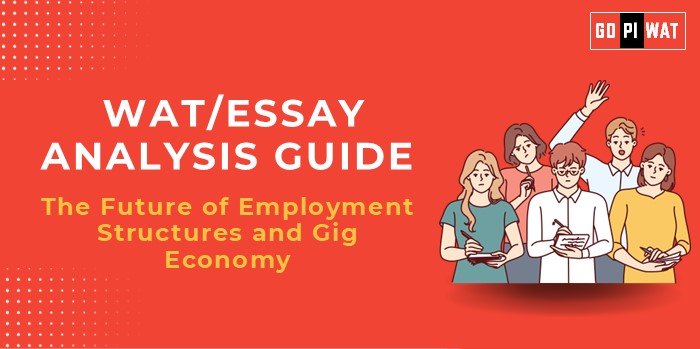📋 WAT/Essay Analysis Guide
💼 The Future of Employment Structures and the Gig Economy
🌟 Understanding the Importance
This topic explores the future of employment structures, resonating with themes of economic growth, technology’s role, and changing workforce expectations. It is crucial for aspiring B-school candidates to analyze labor dynamics, the rise of gig work, and policy impacts.
📝 Effective Planning and Writing
- ⏱️ Time Allocation:
- Planning: 5 minutes
- Writing: 20 minutes
- Review: 5 minutes
- 💡 Preparation Tips:
- Research gig work trends, wage data, and employment policies across countries.
- Identify key stakeholders and analyze the impact on workers, employers, and governments.
💡 Introduction Techniques
-
- Contrast Approach:
“While gig work offers flexibility, its rise sparks debates over job security and long-term economic impact.”
-
- Solution-Based Introduction:
“As gig work expands, balanced regulation offers a chance to reshape employment models.”
-
- Timeline Introduction:
“From digital nomads to platform-based drivers, gig work has evolved, challenging full-time employment norms.”
🔍 Structuring the Essay Body
🏆 Achievements:
- 💻 Flexibility: Gig work allows workers to manage their own schedules, enabling better work-life balance.
- 📈 Economic Opportunities: Gig platforms create income sources for millions worldwide, especially in emerging markets.
- 🤖 Tech-Driven Facilitation: Technology simplifies work matching, enhances productivity, and expands global workforce participation.
⚠️ Challenges with Comparative Analysis:
- 🛡️ Worker Rights: Gig workers often lack protections such as healthcare, insurance, and minimum wage guarantees.
- 📉 Income Stability: Irregular work opportunities lead to financial insecurity for many workers.
- 🌍 Global Disparities: Countries like France have embraced gig regulations, while others, like the U.S., face ongoing debates over fair wages and benefits.
🔮 Future Outlook:
- ⚖️ Hybrid Models: Combining traditional employment benefits with gig work flexibility can offer a balanced approach.
- 🤝 Collaborative Efforts: Governments and private sectors must co-develop gig labor standards to ensure fairness.
- 📜 Worker Protections: Establish policies focusing on healthcare, insurance, and skill development for gig workers.
📄 Concluding Effectively
-
- Balanced Conclusion:
“While gig work offers new horizons for employment, balanced regulations and security measures will determine its long-term viability.”
-
- Global Comparison Conclusion:
“Countries embracing gig worker rights can set global standards, creating employment models that balance flexibility and security.”
🔍 Analyzing Successes and Shortcomings
- 🏆 Key Achievements: Flexible scheduling, economic access, and opportunities for the underemployed.
- ⚠️ Ongoing Challenges: Worker insecurity, irregular wages, and lack of social protections.
- 🌍 Global Context: Examine successful and contested gig regulations worldwide, such as France’s benefits model and U.S. struggles with fair wages.
✨ Recommendations for Sustainable Progress
- ⚖️ Policy Integration: Develop legal frameworks ensuring basic worker protections, including healthcare and wages.
- 🤝 Collaborative Efforts: Encourage private sector and government partnerships to establish labor standards.
- 📚 Worker Support Programs: Invest in training for digital skills, financial literacy, and long-term career development.
📝 Sample Short Essays (100 Words Each)
📌 Balanced Perspective:
“The gig economy’s flexibility and efficiency draw millions, but its lack of stable income and benefits raises concerns. As gig work grows, equitable policies are vital to ensure workers’ security and economy-wide growth. Governments and private sectors must collaborate to balance worker rights with business needs.”
📌 Solution-Oriented:
“To balance gig and traditional work, governments should implement hybrid models, offering gig workers benefits without sacrificing flexibility. By focusing on fair wages, healthcare, and digital training, nations can ensure the gig economy remains a viable and secure employment option.”
📌 Global Comparison:
“Countries like France show that regulated gig work can coexist with employment rights, unlike the U.S. where gig workers still struggle for fair wages. Emerging markets can learn from these examples to craft fair, balanced frameworks for gig workers while fostering economic growth.”


